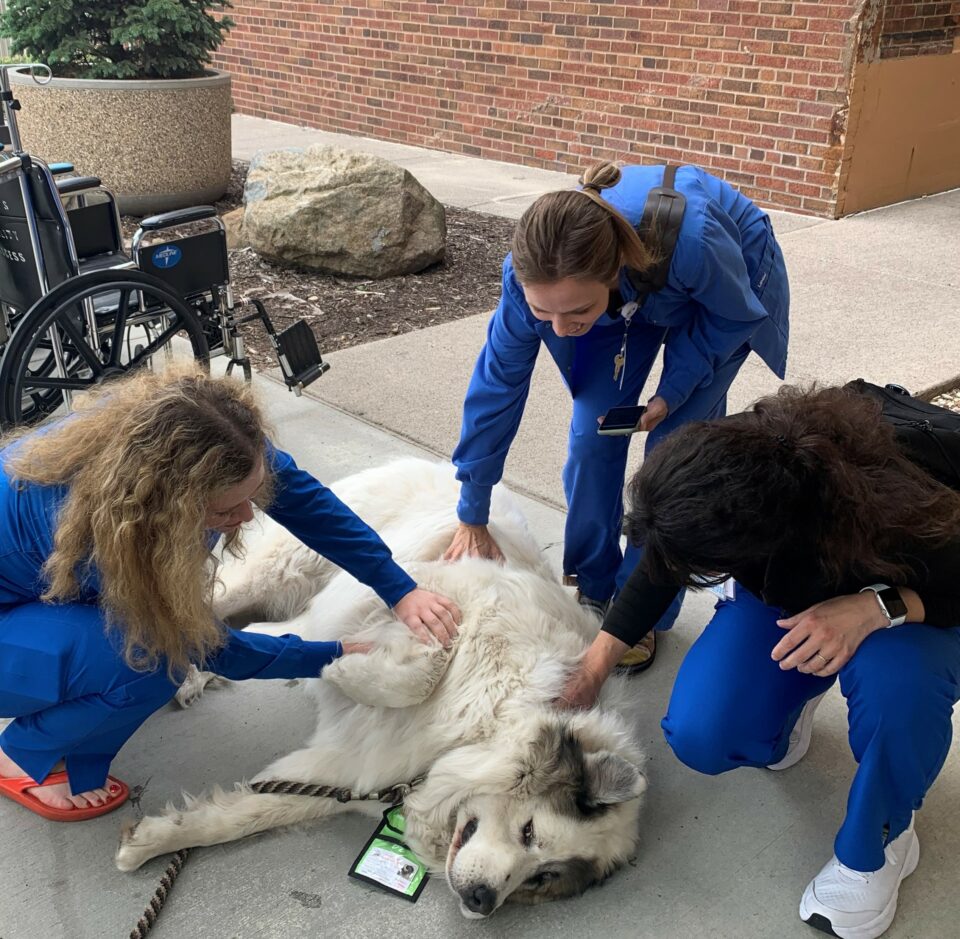The St. Luke’s Hospital Hospice Volunteer Program in Duluth offers an important and vital service to patients in their care. Since 2015 they have been offering a pet therapy program both on-site and throughout the Northland. Local volunteers and their certified therapy dogs provide important comfort, support, love, and animal companionship not only to people receiving hospice care but their families and the facility staff as well. Interaction with the specially trained dogs has many benefits: reducing depression; increasing relaxation; reducing blood pressure, and offering a diversion from physical discomfort individuals may be experiencing. St. Luke’s volunteer coordinator Lily Kline says that because patients in hospice care are at their most vulnerable state, “The therapeutic value of the dogs is huge, assisting in relaxation and lowering stress.”
Therapy dogs can be any breed or size. Their temperament is really the most important factor of a successful fit in the program. Kline says their dogs range from a 9-pound toy poodle to a 160-pound Great Pyrenees mix. Kline reports that nearly 70 patients now are being served by 11 registered dogs.
The St. Luke’s program also extends to rural areas, and in 2023 volunteers and their dogs traveled more than 500 miles. The dogs and their human partner visit assisted living facilities and private homes within approximately 70 miles of the hospital. The registered therapy dog teams will visit people receiving hospice care and their families upon referral or recommendation from St. Luke’s Hospice staff. Kline explains, “Therapy dogs utilized in this program serve in an Animal Assisted Activity (AAA) capacity.” The dogs spend about an hour with each patient, one to two times per week and vary on a case-by-case basis.
St. Luke’s goal is to establish and maintain a comprehensive, high-quality, safe, and effective therapy dog program that benefits patients, their families, and hospice and facility staff, Kline says. “We strive to be the leader in unique, innovative, quality programming aimed at improving quality of life.” She added that in addition to increasing patient and family satisfaction with hospice care, the program is designed to provide a meaningful and worthwhile volunteer experience for therapy dog participants, as well.
There are three steps to become a dog therapy team with the St. Luke’s Hospice program. The first, simply identify if a dog would be a good fit for the program. Things to consider are the dog’s willingness to initiate contact with unfamiliar people; its ability to greet people politely with all four paws on the ground and remain calm and well-controlled around other dogs. If a dog meets these requirements, the dog and its human partner are ready to participate in a three-day training and observation session. St. Luke’s program offers testing sessions each spring and fall. If the dog passes that stage, the final steps are for the volunteer to go through a background check and for the dog to meet health requirements. The dogs must be at least one year old and be up to date on all shots. The approved certification is through a partnership with Alliance of Therapy Dogs. Kline clarifies that “therapy dogs are not service dogs and do not have the same access rights as assistance dogs dictated by the Americans with Disability Act. Pet therapy teams serve in a completely volunteer capacity.”
The program at St. Luke’s does its best to fulfill all the requests for therapy dog visits, but Kline says they are always in the need for more teams, especially in the rural areas they serve. Contact Kline directly for more information or to register for the program: lily.kline@slhduluth.com or call 218-249-6105.




